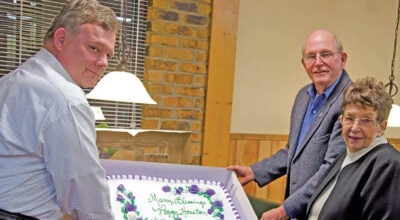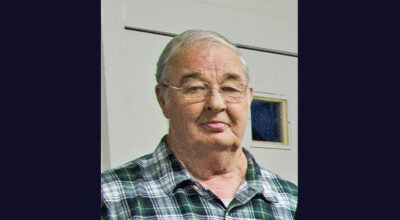Treatment house criticized
Published 10:18 am Tuesday, April 5, 2016
Men’s home contentious subject at council meeting
CHESAPEAKE— The opening of a men’s home by a drug and alcohol rehabilitation center dominated a meeting of the Chesapeake village council on Monday.
Amy Smart, the executive director of Riverside Recovery Services, was on hand to explain the mission of her group, as well as to answer questions and address concerns by village leaders.
“I know there are some concerns, but we’re here to make a difference,” she said.
The group, located on Second Avenue, plans to open the men’s home, which would house 10 clients of the program in a four-bedroom house on Riverside Drive.
Smart said that no sex offenders or violent offenders would be allowed to stay at the home, which she said would be staffed 24 hours a day, seven days a week.
She said doors would be locked, alarms would be in place and clients would not be permitted to leave without a staff member.
Those staying at the home would take part in the state minimum requirement of 30 hours per week of group counseling, she said, where they would be counseled on relapse prevention, relationships and other issues from 8 a.m.-5 p.m.
Some residents and village leaders have expressed concern about the opening of the home.
“What about the burden you’re putting on our village?” Mayor Tommy Templeton asked, referring to the possibility of fights or violence among those staying at the home.
Smart said if there was an incident, the first call that would be made is to a probation officer.
Templeton asked if the officer would always be available, and said that incidents would require the sheriff to dispatch police.
“That puts the burden on us,” he said.
Robert Cochrane, of Chesapeake, who was in attendance at the meeting, asked what the success rate of the program so far had been.
Smart said they have successfully discharged 15 from the program.
When Cochrane asked if this was a small number, she pointed out that they have only been open since October and that it is a six-month program. She said they have served 150 people, the majority of whom are still going through the program.
Cochrane asked why Smart had chosen Chesapeake for the location of the home, rather than somewhere in the county.
“I think you get the idea that we’re not happy with you in our village,” he said.
Smart said that she resides in Chesapeake and that the drug problem is already in the area.
“And the person we bought the home from believes in our mission,” she said.
Cochrane also asked what the home would bring to the village, as far as taxation, since they were not a retail service.
Smart said that the current location has a staff of 12 and that the home would employ more, all of whom would partake of city businesses and restaurants.
“So, minor,” Cochrane said.
Council member Kenny Wolfe asked if any organizations had welcomed the group to the village.
“No,” Smart replied.
“No one knew they were coming,” Templeton interjected.
Council member Paul Hart told Smart that there was a village ordinance that could be used on businesses that were deemed a nuisance if they required an elevated amount of police activity.
“That could happen to you in the future,” Hart said. “I wanted you to understand.”
Smart said she and her partner know they would be held responsible for any problems that could potentially arise, but were confident in the program.
“We’re willing to take that risk and take on that liability,” she said.
Following Smart’s presentation, Hart proposed the adoption of an ordinance, on emergency measures, which would be aimed at new businesses opening in the village.
“We have four new businesses coming to town, and we have no idea who they are,” he said. “We need to know more about new businesses coming in.”
Hart’s proposal would call for a fee on new businesses, as well as permit and approval process.
After some discussion of the proposal and whether the approval process would be constitutional, five of six council members present voted unanimously to send it to the village solicitor for review.
Next, Cochrane addressed the council, representing a consulting firm that is looking to purchase property in the village.
“We’re concerned with the financial well-being of Chesapeake,” he said, outlining several recommendations that he said would improve the village.
First, he said allowing alcohol sales at restaurants and filling stations would help in drawing new businesses to the area. He then called on the village to clean up vacant properties.
“You’re the entrance to the great state of Ohio,” he said. “It shouldn’t be so trashy.”
He called for the area between Chesapeake and Proctorville to be incorporated, so that the villages could act as “a conglomerate” with better law enforcement and services.
“You would have more reach up the river, and they would have more reach down the river,” he said.
And, finally, he called for the village hall to relocate and the current property to be sold and proposed for commercial use.
Cochrane said the group he is working with would like a response on their ideas by May.
Cochrane was followed by Joe Robinson, who came before the council to implore them to do something about dilapidated buildings in the area.
“We’re constantly dragging our feet on these old homes,” he said, noting that many were being used by drug dealers.
Templeton said that he had wanted to make this an early priority of his administration, but had been forced to change plans to focus on zoning ordinances due to the opening of the Riverside Recovery home.
“I had full intentions of working on that, and then this happened,” he said. “It threw a monkeywrench into the works.”
Templeton said a zoning proposal is under way, but that it is a slow process, which could take up to a year.
“If we don’t come up with a zoning ordinance, there’s going to be five, six, seven, maybe 10 of these places,” he said.
In other business, the council voted to rescind ordinance 81-7, which prohibited the excavation of roadways. The meeting was followed with an executive session to discuss a personnel issue.
A special meeting of council is set for next Tuesday.





